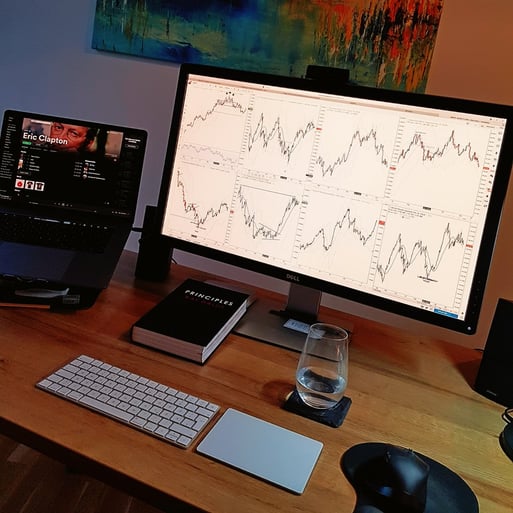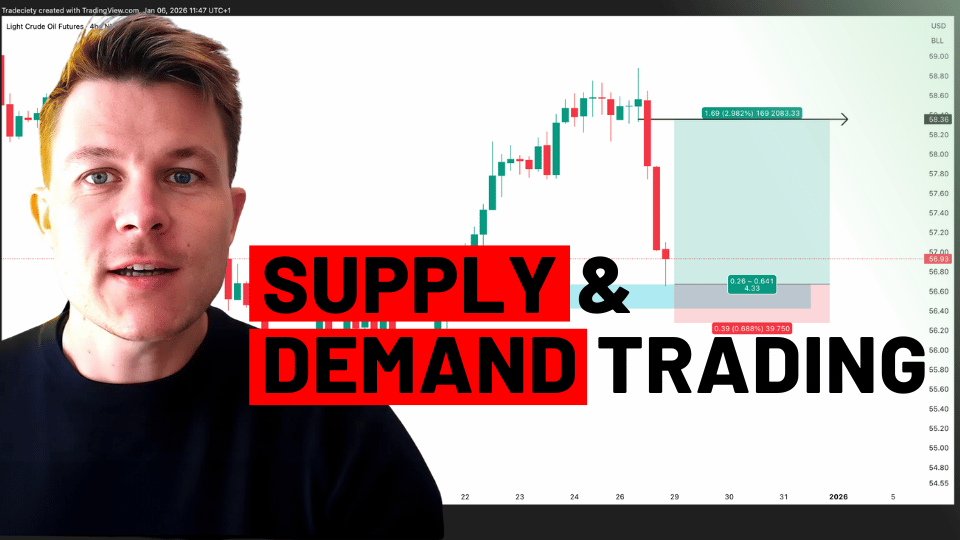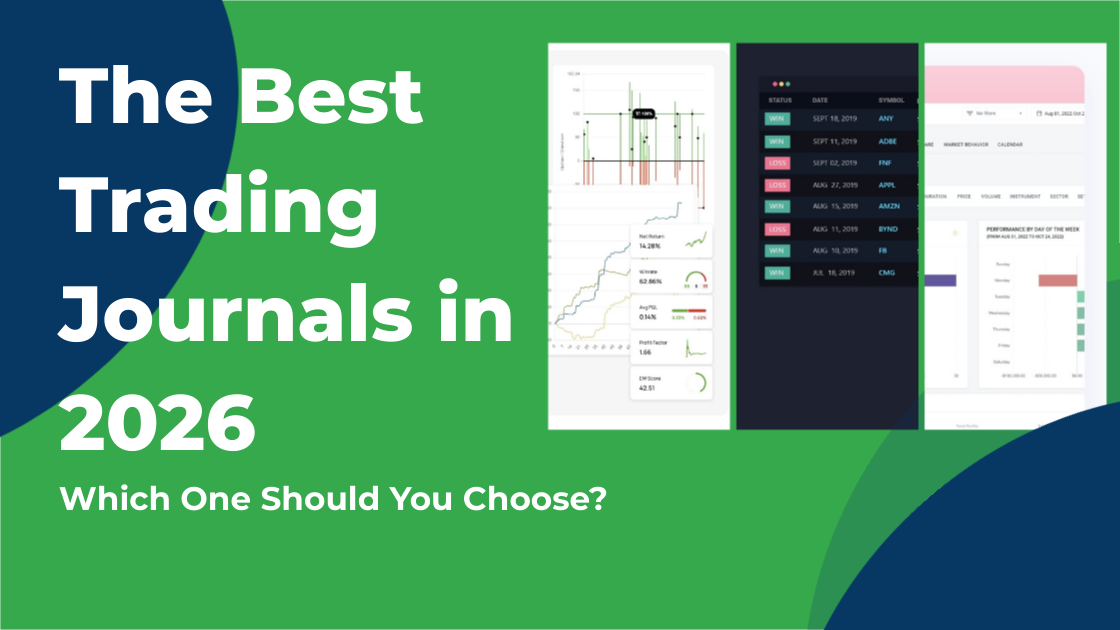Supply and Demand Trading in 2026
We have been trading supply and demand strategies for over ten years, and they have stood the test of time remarkably well. Supply and demand is...
7 min read
Rolf
Apr 3, 2016 8:00:00 PM

How can you achieve consistent results in your trading and become a full-time trader? When I look back at my own path, I can clearly see what helped me make the final step and it’s something 99% of all traders overlook.
In today’s society where the average attention span has dropped to 8 seconds, where 140 character tweets seem too long (#TLDR) and people skip YouTube videos after just a few seconds, we easily lose the connection to ourselves.
The concept of “self-awareness” has a spiritual ring to it and most traders will not listen to you if you start a trading conversation by referring to self-awareness. However, if you really want to make this work and if you want to finally realize your goal of becoming a pro trader, you have to listen and I am 100% certain that you will be able to relate to my story as well.
Unfortunately, most people, and especially traders who are often numbers driven and very rational, associate the term self-awareness with something spiritual and connect the wrong assumptions with it. And then they won’t listen and miss out on this unique opportunity.
This is very unfortunate because I have never met a successful trader who is not also very self-aware. You’ll see soon that self-awareness is something very different from what you believe it is.
In its essence, being self-aware just means that you are aware of what you are doing and how you do things. This sounds trivial and you probably think that you know what are you are doing since it’s you who are doing those things. From my own experience, I can say that most people aren’t.
Next time you walk down a street, stop yourself and recall what you were thinking about at that very moment and I am sure that you don’t even remember because you were “lost in thought”. The average human has 50,000 thoughts per day.
Another example: how often have you checked your watch just to realize 5 seconds later that you don’t actually remember the time and you had to take another glance at your watch again? And how often did you open another browser tab just to realize a few seconds later that you already had the same website open in a different tab?
The other aspect of self-awareness describes the ability to assess one’s level of expertise accurately. We all know those people who believe that they were born to be singers, but when they open their mouths you think a cat is dying. Or people who think that they are a “numbers person” and then follow the wrong career path, just to realize 20 years later that they should have done something completely different and that they are not very good at what they are doing.
You see, self-awareness or awareness in that matter isn’t that common anymore and we will now explore how it damages our trading.
A trader who is not self-aware goes through his trading day without really understanding what he is doing and I was guilty of that myself for years. I would just fire up my trading platform in the morning, flip through random markets and time frames and hunt for signals. I’d place my trades throughout the day, manage my orders to the best of my abilities (or at least I thought I did) and tried to squeeze out a few points here and there. In the evening I would then wonder what went wrong, why I did not make any money and I hoped that things would somehow turn out better the next day.
I never really understood that my lack of success had something to do with my overall approach to trading and not with my methodology. I always assumed that it was just a matter of time until I would (somehow) find “what works” and that I was a well-educated trader already.

These days, I take my trading very seriously and I approach it from a professional and self-aware perspective.
The optimism bias is an effect that makes smokers believe that they will be among those who escape cancer, it gives bikers the confidence to speed during bad weather and it gives couples the certainty that they will stay together happily for 50 years. 2
The optimism bias makes us neglect all the statistical odds and it makes us blind to all the examples and facts that show us what is likely to happen.
Without the optimism bias we would feel terrible and scared all the time because being too realistic will make us aware of all the dangers around us. At the same time, it keeps us from reaching our full potential when we don’t see the necessity to change our behavior because we don’t understand the consequences.
[Research shows] that people who are brutally honest with themselves are not as happy day to day as people with unrealistic assumptions about their abilities.
The illusion of control persists like the other positive illusions because you need to feel as though you can push against the world and notice it move. Without that belief, your spirit dwindles quickly. 1
Let me quote an interesting finding from a study done on traders:
Very few [traders] rated themselves as below average. They attributed their losses to difficult market conditions and situational mistakes. Surprisingly, they rationalized losses as part of their learning curves–even when those losses extended for many months and even years! 3
This nicely shows the optimism bias and a lack of self-awareness in action. Just look around you and you’ll see that most people see themselves as better than they actually are without realizing that this is stopping them from reaching their full potential. I do not mean this as criticism but rather take it as a wake-up call to help you develop positive behavioral patterns. If you want to become a full time trader, you need to start behaving like one.
As most traders, I was losing money for quite some time at the beginning and whenever I was looking around, I noticed the same behavior amongst all those failing traders as well. It finally clicked with me and I realized that I had to do something different if I wanted to see different results.
I took an honest look at myself and I realized that I was not being professional enough about trading and I understood that I couldn’t reach the level of success that I wanted if I kept doing the same things. This first realization of self-awareness helped me understand that I needed to get serious.
I stopped trading for a few months and spent a lot of time thinking about the things I was doing that did not work. I was also thinking about those things I wasn’t doing (mostly because they sounded like hard work), but which I knew could make a huge difference.
Opportunity is missed by most people because it is dressed in overalls and looks like work. – Thomas Edison
Reflecting and becoming more self-aware allowed me to identify a handful of things that I needed to change. I realized that if I kept doing what I was doing, I would be wasting my time because I’d keep losing money. I already had spent (wasted) a few years without seeing a real improvement in my trading so it was time to either quit or take it seriously.
The level of honesty definitely hurt initially and looking at the task ahead made me very humble, but I understood that this was what I needed to do or otherwise I had to quit trading.
Now let me give you some practical examples of how you can become more self-aware in your trading and why most traders fail when they don’t follow the steps:
Just like so many traders, I was guilty of “system hopping” and constantly making changes to my trading approach. Although I never saw any real improvements in my trading, I somehow hoped that it was just a matter of time until I would find the “right” method.
I once read the book “The one thing” and it made a lot of sense to me and I decided to pick my one thing and try to master it. Trend-following never really made too much sense to and only when I came across reversal trading, it started to click.
These days, I am wondering how I could have been so blind. In a world where 99% of all traders read the same book, trade the same patterns and follow the same principles, 99% of them get the same results. Once I moved away from the conventional approach and saw things differently, my trading changed.

This is me during a very intense study and trade planning session in Japan before the market opened.
I always saw journaling trades as a tedious and boring task. Truth be told, it still is today to some degree, but there is just no alternative to it.
I recommend our Edgewonk trading journal which is now used by thousands of traders worldwide.
Like so many other losing traders I would never look at my past trades and I would so miss many great opportunities of becoming better. Once I started journaling and reviewing my trades, I quickly started to see where my problems were and I could easily identify the best setups and trades.
Journaling and really taking the time to sit down and think objectively about your trading will raise your level of self-awareness to new heights. It’s a true game changer.
In the beginning of my trading, I would just flip through my markets and time frames until I found a signal and then just pull the trigger straight away.
Today, I approach my trading very differently. First, I plan all my trades in advance in my trading plan and I place price alerts.
Then, before making any decision, I step back and review the situation. I pull out my checklist, confirm that I have all my criteria and I make sure that I am not overseeing something.
Many people argue that they listen to their gut feel and just make intuitive decisions. I recently came across an interview of the #1 chess player in the world and that’s what he said about intuition:
I usually know what I am going to do after 10 seconds; the rest is double-checking. – Magnus Carlsen
In today’s world, the ability to sit down and really thinking something through has been lost. We always think that we know what we are doing and why we are doing things but this is clearly not the case as I have shown in the beginning with my examples.
Taking time out, sitting down with yourself and writing things down is powerful because it sends a message to our conscious and sub-conscious that those things that we write down are important to us. When we write down goals, for example, we are more likely to achieve them.
There is a great program developed by a psychiatrist that is helping people become more aware of their goals and plan their future. I really recommend taking this short program so that you can become clear about what you want and how you are going to get it. Read: Future Authoring Program
I really hope that this article helped you understand how to tackle your trading and your life in general. This article is meant to be an eye-opener and food for thought.
Start looking at your trading objectively, start becoming more aware of your behavior and actions and make a commitment to take trading seriously.
References
1 David McRaney – You Are Now Less Dumb: How to Conquer Mob Mentality, How to Buy Happiness, and All the Other Ways to Outsmart Yourself
2 https://www.brainpickings.org/2014/06/04/david-mcraney-self-enchancement-bias/

We have been trading supply and demand strategies for over ten years, and they have stood the test of time remarkably well. Supply and demand is...

3 min read
Choosing the right trading journal is essential for traders wanting to analyze performance, refine strategies, and improve consistency. In this...

3 min read
“95% of all traders fail” is the most commonly used trading related statistic around the internet. But no research paper exists that proves this...